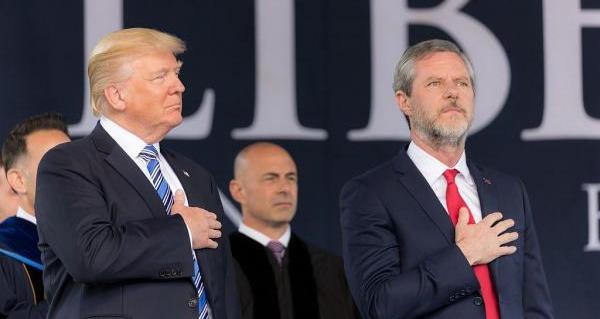When Donald Trump needs a hug, he can count on conservative, white evangelicals.

“We’re under siege,” Trump told his evangelical friends, but we will emerge “bigger and better and stronger than ever.”
The polls tell us that support for Trump by white evangelicals did not wane in the first 100 days of his tenure in office–and his approval rating is twice as high among evangelicals than for the general population. I haven’t seen stats since Comey’s testimony, but I doubt anything has changed since.
It’s low-hanging fruit to say that white evangelicals (still!) love Trump because of his assurances that he’ll protect them and their rights. He’ll preserve their freedom to practice and hold their religious convictions–whether that same freedom applies to other groups and to other (actual minority) religions doesn’t matter so much.
But another way to understand why so many evangelicals continue to support Donald Trump might be by reference to the authoritarian impulses that pervade conservative Christianity in the U.S.
Those authoritarian impulses are grounded in conservative Christian theology, and they hearken back to more sophisticated variants in medieval theology.
To put it very simplistically:
God is God.
God can do whatever God wants.
Whatever God wills and does, is right, good, and just.
The strand of medieval theology I mentioned above is sometimes called “theological voluntarism.” In other words, “volition,” or the will (God’s will in particular) is what determines what is right, good, true, or honorable. This goes all the way back to Socrates’ question (via Plato’s writings) of whether something is holy or just because God makes it so, or whether God recognizes what is holy or just and therefore declares it to be so.
In other words, for theological voluntarists, might makes right. The will or volition of the Creator determines the value of actions, entities, characteristics, events, and so on.
In ethical theory, this goes by the name “divine command theory.” Whatever God commands, is the ethical thing to do.
If, a God says to Abraham, “kill your son, your one and only son,” then it is good, right, and just to kill your son. It’s the right thing to do, simply because God says to do it.
Now, I have to admit, if God told me to do that, I’d turn the other way and I’d be done with God forever. Though I’d make a quick appointment with a therapist, first.
But I wouldn’t submit to God’s authority and try with all my might to envision the command as somehow good or righteous or just–even if I suspected it was just a “test” of my faith.
(Side note: Kierkegaard is often taken to be a proponent of divine command theory because of his reflection on the problem of Abraham and Isaac in his masterful and provocative work, Fear and Trembling–but whether he was or wasn’t a divine command theorist depends on how you interpret that text).
But growing up evangelical, I have to say that, when people refuse to countenance a command like that from God as somehow “just” (despite every inclination of the body, heart, and mind), it smacks of a lack of faith. A lack of trust that God knows what “he” is doing, and since God’s wisdom surpasses ours infinitely, our response should be simply to “trust and obey, for there is no other way” (as the old hymn says).
My point here is simply that this impulse of “might makes right” is based on some very sophisticated theological and ethical perspectives. But in contemporary evangelical churches, what gets funneled down is a brutish inclination toward authoritarianism.
And in terms of how conservative evangelical apply “might makes right” theology to political leaders, it goes something like this:
God anoints and ordains leaders to carry out God’s plans, whether we like them or not.
Those leaders (when we like them and when they support our causes!) function a bit like “puppet kings” for God.
Our job isn’t to critique them and we certainly shouldn’t disobey them; rather, we should treat them as bearing the authority of God via the divinely ordained medium of temporal government.
This results in a willingness to accept deep moral or other flaws in our leaders (because, well..remember King David?). A little caveat: it results in a willingness to accept leaders regardless of their flaws because if they are clearly on their side.
With the emergence of this new religious right in our midst, it’s conceivable that our nation might not ever have the national will–or even the rational clarity–to say, “enough is enough,” and to declare that might does not make right.










